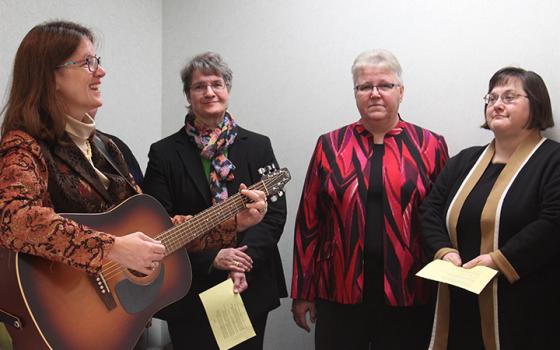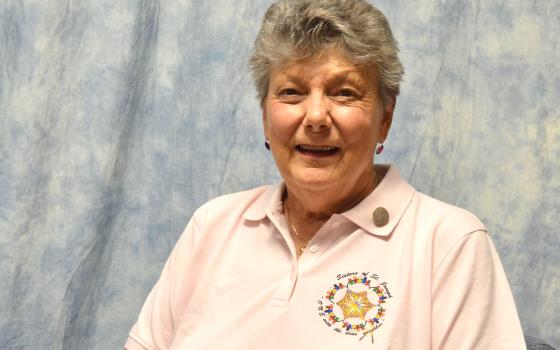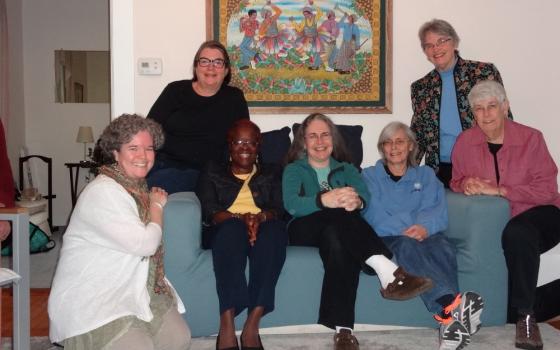Editor's note: Global Sisters Report is presenting an occasional series about new forms and emerging ways of religious life.
Some 360 years ago, when the first Sisters of St. Joseph organized in LePuy, France, another lesser-known group of women organized with them: the agrégées. Just how these "associated sisters" disappeared from common and institutional knowledge isn't clear. However, in the last two decades, agrégées have made a resurgence in some St. Joseph congregations in the United States.
According to Sister of St. Joseph Mary McGlone, author of an upcoming history of Sisters of St. Joseph in the U.S., from the very beginning, agrégées lived according to the rule of the Sisters of St. Joseph, but for various reasons were unable to live in community in LePuy. Broadly speaking, the modern iteration of the agrégée is someone, usually middle-aged or older, who has made a perpetual commitment to a Sister of St. Joseph community but who remains financially independent while making monetary contributions to the congregation.
For some, to hear the story of this revival is to hear a story of the Holy Spirit at work. At separate times — and independently of each other — the Sister of St. Joseph congregations in Concordia, Kansas; Erie, Pennsylvania; and Springfield, Massachusetts, dug into their history and found the agrégées. Each congregation then reimagined agrégées for the modern day, creating new membership models to foster their vision.
Concordia, Kansas: back to the future
The first modern-era agrégée in the United States was Sr. Rosabel Flax, who joined the Sisters of St. Joseph of Concordia in 2008. The congregation had rediscovered the agrégées about five years earlier while researching their history in an effort — led by Srs. Marcia Allen and Bette Moslander — to reconnect to their roots.
"We were thinking about somehow making that part of our history a part of our present. We just weren't exactly sure how we were going to do that or how it would fit in," said Sr. Dian Hall, a member of Concordia's vocations team.
In 2006, the idea of reinstating agrégées as a form of membership was presented to the congregation for a vote and passed unanimously. That same year, Flax, a 58-year-old retired high school principal, heard about the program and thought it might be the right fit for her.
"She had been thinking about religious life but could not make a regular canonical commitment," Hall said of Flax, who died in 2014. "She had financial obligations to take care of. She had an aging mother."
By most accounts, the agrégée program in Concordia is the most "structured" of the three available. Concordia agrégées must be single, "mature" Catholic women, and they are considered to be vowed members of the congregation — they take a vow of fidelity to the community rather than a canonical vow, meaning their vow is a private matter not governed by church law.
"We consider ourselves 21st-century sisters," said Concordia agrégée Sr. Lorren Harbin, an alternative high school teacher who formerly worked in training and development for Walt Disney World. "We believe there is a change in progress because you don't have the young people coming in that are basically raised in community. You're having professionals come in who've lived life and can contribute lots of talents and time and treasure. It's just a different look."
Agrégée and canonical sister candidates in Concordia undergo the same formation program; in fact, in Concordia, women only declare what type of vow they would like to take at the end of the two-year process. Agrégée sisters participate fully in congregational assemblies and elections, and they hold important roles in congregational life.
Harbin, for example, serves with Hall on Concordia's vocations team. Sr. Ann Ashwood, a 72-year-old agrégée and widowed mother of five, works at the congregation's retreat center and has served on the U.S. Federation of the Sisters of St. Joseph's novitiate training team.
For Ashwood, the agrégée program is a way for women who share the charism of the Sisters of St. Joseph yet don't feel called to the traditional model of religious life (like Harbin) or have been precluded from it by a previous vocation such as marriage (like herself) to find a spiritual home.
"We have all lived the charism for most of our lives — probably when we were children," she said with a laugh. "Next to the gift of my five children, becoming a Sister of St. Joseph has been God's greatest gift to me."
Erie, Pennsylvania: something more
It was more than a decade ago, but Charlene Kellerman, 55, remembers driving in a car with Cindy Polesnak, a fellow associate of the Sisters of St. Joseph of Northwestern Pennsylvania, discussing their mutual need for "something more" than association. They just weren't sure what that something more could be.
"I knew it wasn't vowed life," Kellerman told Global Sisters Report. "So imagine being called to something that doesn't exist."
In 2007, Kellerman and Polesnak approached the congregation and asked them to explore a relationship that was more than association but was not vowed life — a request Sr. Susan Herzing, who now heads the agrégée program in Erie, admits wasn't taken seriously initially.
"We didn't think there was such a thing, so we kind of put in on the back burner," she said, chuckling. "But they wouldn't go away."
Herzing said the Erie sisters started studying other communities; they contacted Concordia and then adjusted the Concordia agrégée model to fit their own needs.
In January 2016, nine women — including Kellerman and Polesnak — became Erie agrégées.
Unlike in Concordia, agrégées in Erie are not considered vowed members, although they, too, make a lifelong noncanonical vow of fidelity to the community and participate in a multiyear formation process. According to the congregation's "Guide for Agrégées," Erie agrégées are invited to attend "most" community gatherings and meetings and to volunteer for task forces and ministries sponsored by the community. Agrégées are also welcome to live in community with vowed members if they choose.
Erie agrégées also differ from Concordia agrégées in that, while they must be "mature" Catholic women, they can be married. Fifty-five-year-old agrégée Betsy Wiest, for example, cites having her 1986 wedding in the sisters' Little Villa chapel as an example of her lifelong devotion to the sisters.
"The sisters have been a part of every major thing in my life," Wiest said, noting that she's also an alumna of the sisters' elementary and high schools in Erie. In fact, it was this connection to the sisters that initially motivated her to become an associate 11 years ago. But like Kellerman and Polesnak, Wiest too found she wanted something more than association.
"When we were associates, every year, they'd send this little card that said, 'Do you still want to be an associate?' And that irritated the daylights out of me because I didn't want to be an associate just for a year, I wanted to be involved for a lifetime," she said. "I just knew there had to be something more, and when I found out about the agrégée program, I thought, 'Well, this is the more for me.' "
It's not that associate programs are inherently lacking, the agrégées say; it's just that agrégées have a different vocation. Agrégée Cindy Brown, 61, put it this way: "It's not so much about the program as it is about the call within. It's about who I am and what God has called me to — a deeper commitment to my response to God and then to this community."
Springfield, Massachusetts: inclusive community
While Concordia was the first congregation to actually revive an agrégée program in the United States, the Sisters of St. Joseph of Springfield were the first to start considering it.
"It goes back quite a while," said Sr. Natalie Cain, the vocation director in Springfield, "almost 20 years."
Sometime in the 1990s — inspired by women who were asking for a form of membership that allowed them to live the charism of the Sisters of St. Joseph without making vows of poverty, chastity and obedience — the sisters set up an ad hoc creative membership committee. The committee began researching and came across the original agrégées. But the committee wasn't just dealing with would-be agrégées. It was also tackling the larger issue of congregational structure.
In a 2005 chapter meeting, the committee proposed a "Community of St. Joseph" model in which separate but equal "life forms" exist around a single core: the charism of the Sisters of St. Joseph. The committee also floated the idea of agrégées being one of those life forms. The congregation approved the idea, and in 2008, three women joined the community as agrégées.
In Springfield, agrégées don't make a vow, but rather, a promise to the congregation after an "intense" orientation. Springfield agrégées can be women or men, single or married, and they don't have to be Catholic. They participate in agrégée retreats several times a year and have monthly Skype meetings with the other agrégées.
Agrégées differ from Springfield's associates (which make up their own life form) in that agrégées are required to tithe to the community, must live a simple lifestyle and must participate in a ministry related to the mission of the congregation. Associates, on the other hand, make voluntary donations to the community, and the congregation does not direct their lifestyles and ministries.
When Marisa Brown Ludwig, an associate-turned-agrégée, began her relationship with the Sisters of St. Joseph in 1992, she was a practicing Catholic, attracted by the sense of belonging that association gave her in a religion where she felt isolated. She was one of the first three Springfield agrégées in 2008 despite having left the Catholic church — or, as she prefers to put it, after having moved out into greater Christianity — 12 years earlier.
Today, the married mother of two is ordained in the United Church of Christ, which Ludwig says has not changed her relationship with the Sisters of St. Joseph.
"My ordination was unique in that there were easily 20 nuns there," Ludwig said. "It was very powerful for both United Church of Christ people and for the sisters."
Teresa Foley — a former vowed sister — also remains connected to the Springfield congregation through the agrégée program.
"I was a member of the creative membership committee," Foley told GSR. "And to tell you the truth, at the time, I didn't really think that I was going to be a creatively associated member," she added, laughing.
Foley joined the community in 1969, and her primary ministry was prison chaplaincy. She also served as a public health education specialist with an HIV team. Foley said she began to run afoul of church hierarchy after participating in an interfaith communion service in the prison and — after meeting gay and lesbian people in her HIV work — questioning the Catholic Church's position on homosexuality. She also had issues with the way the church had handled the sex abuse crisis.
Foley wrote to the Springfield bishop in 2006, laying out her grievances. Foley said the bishop responded by saying she needed to recant her letter if she wanted to remain a vowed member. Foley would not recant.
"When it came time for exclaustration papers to be signed, I refused to sign them because I said, 'I am living the charism to the fullest that I can. And I'm not going to say that I'm not,' " she said. "I'm sure I'm listed as exclaustrated by the community because they have to do what they have to do, and I understand that. But I had to do what I had to do. So I'm an agrégée of the Sisters of St. Joseph."
A new frontier
"I think [the agrégée program] offers energy and vitality," said Harbin, noting that in Concordia, women from around the globe make their way to northern Kansas to learn more about the agrégées because they've been turned away from other communities only offering traditional membership options.
And, indeed, since their inception, all three agrégée programs have grown. Hall says Concordia has had new agrégées make vows every year. The Erie group currently has two agrégées in formation, and the Springfield group has grown from three to five.
"I believe that there increasingly will become a form of religious life in which women are financially independent: They get themselves their own educations, and they have a way of providing for their children or for their parents," said Springfield's Ludwig. "And it doesn't mean that we don't desire to be in religious community with each other and to commit our lives to God."
It's an idea that, while currently being rebirthed in the United States, has always been at the core of the Sisters of St. Joseph's conception of religious life.
"We went back," said Herzing of Erie. "I have a little quote here from the original spiritual director, Fr. Jean Pierre Médaille, and it says: 'All are called to enter more profoundly into their vocation, even if their ways of living it are different.' "
[Dawn Araujo-Hawkins is a Global Sisters Report staff writer. Her email address is daraujo@ncronline.org. Follow her on Twitter: @dawn_cherie.]





